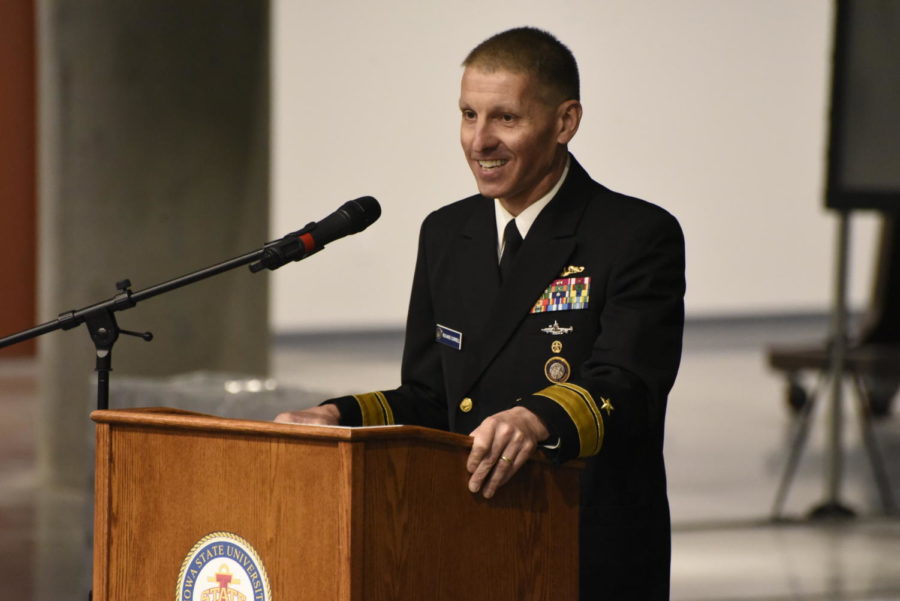US Strategic Command conference ongoing at Iowa State
March 11, 2020
Iowa State played host to the start of the 2020 Deterrence and Assurance Academic Alliance Workshop and Conference on Wednesday, the first time the conference took place outside of Nebraska.
“It is my great pleasure to welcome all of you to the 2020 Deterrence and Assurance Academic Conference and Workshop here on the campus of Iowa State University,” said Beate Schmittmann, dean of Liberal Arts and Sciences Administration. “We are delighted to see you, we are delighted that Iowa State University was selected to be the host of this institution and we look forward to two days of very impactful and meaningful conversations and discussions.”
This is the fifth year of the workshop and conference.
Gov. Kim Reynolds delivered opening remarks, welcoming the attendees to Iowa.
“It truly is an honor to welcome such a distinguished group of leaders to the state of Iowa for the U.S. Strategic Command’s fifth annual Academic Alliance Conference and Workshop,” Reynolds said. “So as you heard, this is the first time this international conference on deterrence and assurance has been held outside of Nebraska, so we are very excited to host you in Iowa.”
Various panels took place Monday with Iowa State faculty and invited faculty from various institutions alongside staff from U.S. Strategic Command and U.S. Cyber Command.
Doug Jacobson, university professor of electrical and computer engineering, said he would speak on a panel on cybersecurity.
“Iowa State has a very large cybersecurity program both at the grad and undergrad level, [it is] interdisciplinary with departments ranging from political science to math to engineering,” Jacobson said. “So we have a long history working in the area of cybersecurity.”
Elizabeth Durham-Ruiz, director of Command, Control, Communications and Computer Systems, chief information officer and director of the Nuclear Command, Control and Communications Enterprise Center at Offutt Air Force Base in Nebraska, was set to speak on the panel alongside Jacobson.
Durham-Ruiz explained what she is hoping to achieve while in Ames. She said she was looking for engineers, data scientists and cognitive scientists, among others to help “more effectively make decisions in the future” with regards to getting information to the president from many different leaders faster in communications within U.S. Strategic Command.
“Really what we’re looking for, and Major [Jeremy] Millar is kind of leading this effort for me as we’re looking for people who think differently, who want to join us on this journey as we’re trying to design the next generation for the Nuclear Command, Control and Communications,” Durham-Ruiz said. “We’re going to need people who think differently. I love the people who designed the system, I was part of some of those teams, but I really want to make sure that we get people out there who think about how we can do this differently.”
Some of the systems in U.S. Strategic Command, while still functioning, were designed in the 1970s and 1980s, Durham-Ruiz said.
“[They were] very robustly designed but still they need to be upgraded like everything else does,” Durham-Ruiz said. “So still functioning today, upgrading for modern capabilities and we’re working right now very hard on how we can actually design the system for the future.”
Durham-Ruiz said this year is the first year they are doing an internship program on their own after a pilot program, and also said Millar is overseeing it.
“We’ve got programs both for current students as well as recent [graduates],” Millar said. “So if you’re within two years of graduation or you’re currently enrolled in an academic institution of higher learning, we have a program we can slide you into.”
Millar said there were “personnel folks” who are in the Student Innovation Center who could discuss that.
Rear Adm. Rich Correll, director of plans and policy for U.S. Strategic Command, said this is the first conference he has been to. He assumed his current duties in July 2018.
Correll said regardless of the academic background an individual has, there are positions at U.S. Strategic Command where that background may be needed.
“That speaks to the broad mission set that we have in terms of maintaining strategic deterrence,” Correll said. “That crosses all of the domains […] that you could associate with competition or war. So it would include the more traditional domains of land, air, sea but also space, cyber, the information environment. So we have a very broad experience within the headquarters and very broad backgrounds in terms of academic backgrounds within the workforce.”
The conference and workshop is set to continue Thursday with a tabletop “wargame” scenario.
“It would be a scenario where one of the countries that is adversary or antithetical to the United States is taking actions that threaten the stability within the national security […] across the globe, both the U.S. and our allies,” Correll said.

















